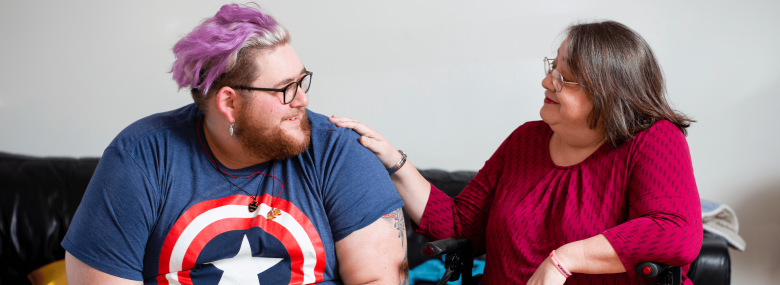
Opioids are strong and effective pain medicines when used as directed by the doctor. But, opioids can come with a risk of harm, can cause side effects, increase sensitivity to pain, and maybe addictive if used long-term.
Find out more about opioids here or if the person you’re caring for is taking opioids – Factsheet 1: How do I know if the person I’m caring for is taking opioid medicines?
Unsafe opioid use
Over the past 10 years in Australia, there has been a significant increase in harm and deaths from the use of opioid medicines. Every day, nearly 150 people are taken to hospital and 14 people admitted to emergency departments because of issues relating to opioid use, and three people die from the harm caused by opioid use. [source: TGA]
The doctor or pharmacist will usually provide information when providing opioids but research shows many people don’t realise they’re taking opioids. This means people could be using opioids in an unsafe way without knowing.
How to tell if someone is not using opioids safely?
Opioids can be dangerous. If the person you care for is taking opioid medication it’s possible they could become dependent without realising it. The body can develop a tolerance which reduces the medication’s effectiveness. That means more and more is needed to get the same pain relief.
If they’re not taking the medication correctly there’s more possibility of harm.
It can be difficult to tell if someone is using their opioid medicines unsafely. Here are some signs to look out for:
- Taking more of the medication than prescribed (a higher dose) or more often
- Taking more medication for non-pain reasons or because it ‘makes them feel better’
- Taking the medication in a different way than it’s meant to be taken
- Making excuses to get another prescription or seeing another doctor to get extra supplies
- In denial of changes in their behaviour
- Past unsafe use of medications
- Making poor decisions or changes in mood or behaviour that are unusual for them (e.g. mood swings, being agitated or drowsy after taking their medication)
- Changes in their sleep patterns or being anxious, grouchy or depressed
- The medication is having a negative impact on their life:
- Avoiding being with friends and family or starting to have trouble with relationships
- Losing interest in, or experiencing new problems, at school, work or hobbies
- Taking part in dangerous behaviours unusual for them, such as driving after drinking alcohol
- Quality of life or living standards deteriorate, e.g. they stop looking after their personal hygiene.
(Adapted from ScriptWise.org.au)
Things you can do to help
It’s natural to worry if the person you care for is not using their medication safely. But it may not be easy to raise it with them. If you are concerned, it is important to reach out to a professional and get advice. It’s easier to help someone when you have the support of others.
It’s safer to keep medications in a safe, (preferably locked), location, such as a medicine cabinet. This is particularly important if there are children living in the same place.
Start by talking to the doctor or pharmacist about their medication. Find out what the signs are when someone is not taking opioids safely and what your concerns are, for example, they have recently increased their medication, or are using it in a different way.
Here are some other ways you could help.
- Provide information on the harms and risks to the person you’re caring for.
- If you feel comfortable, talk to them about how their behaviour has changed and how it affects others in their life, for example, their kids or loved ones.
- Provide information on specialists who can help, or local support groups. Leave the information lying around if you don’t feel confident raising the issue.
- Look into different ways to help manage pain like heat packs, exercise, meditation or massage. Find more options for managing chronic pain on the Health Direct website.
It can take courage to raise the issue of unsafe use of medications with a loved one. If you don’t feel comfortable doing so, seek help from professionals.
If you speak to the one you’re caring for, don’t be hard on yourself if it wasn’t ‘heard’ the first time. If they’re not listening or responding well, take a step back and let the professionals deal with it.
Don’t forget your own mental health. Caring for someone who’s not taking their opioid medications safely can be emotionally draining. It’s important to take good care of yourself.
Visit the Carer Gateway website or call them on 1800 422 737 to find local services and support for you as a carer.
The Carer Gateway makes it easier for you to find help, from counselling and peer support to respite care, home help, and equipment.
Alternatively, you can get more information for the person you’re caring for about taking opioids safely by calling Medicine Line:
Call 1300 633 424 (1300 MEDICINE) – (Monday-Friday 9-5 AEST).